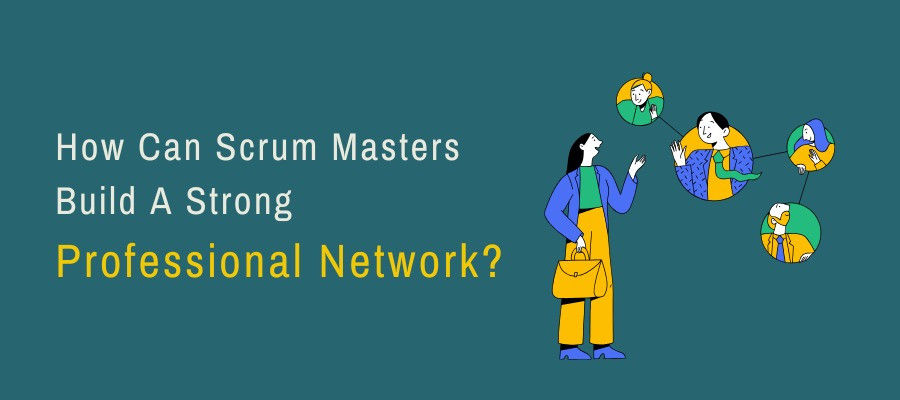How Can Scrum Masters Build A Strong Professional Network?

Building a strong professional network is essential for Scrum Masters to succeed and advance in their careers. Networking allows Scrum Masters to stay updated on industry trends, share knowledge, and build relationships with like-minded professionals. Here’s how Scrum Masters can develop and maintain a strong professional network that opens doors for career growth, new opportunities, and personal development.
1. Join Scrum-Specific Communities
Joining Scrum-specific communities can directly connect you with other professionals. Scrum Alliance, the home of Certified ScrumMaster® (CSM), offers an online community where Scrum Masters can share resources, engage in discussions, and connect with others. Similarly, Scrum.org offers forums to ask questions and share experiences with other Scrum Masters.
2. Attend Scrum Meetups and Conferences
Meetups and conferences are potent ways to meet like-minded professionals. The Scrum Alliance hosts global Scrum Gatherings that bring together Scrum Masters from all over the world. You can also check out local Scrum meetups via platforms like Meetup.com. These events allow you to network, exchange ideas, and build relationships that could open doors for job opportunities.
3. Leverage LinkedIn for Networking
LinkedIn is the primary platform for professional networking. Scrum Masters should ensure their profiles reflect their Scrum expertise. Participating in discussions, joining Scrum groups, and connecting with fellow Scrum professionals can help you expand your network. Joining LinkedIn groups like "Scrum Masters Community" or "Scrum Master Network" can allow you to engage with the broader Scrum community.
4. Utilize Online Scrum Communities and Forums
There are many online platforms specifically for Scrum professionals. The ScrumMaster.org forum is a good place to ask questions, share experiences, and network with other Scrum Masters. Similarly, Reddit has a thriving community of Scrum Masters on subreddits like r/scrum, where you can interact and learn from others.
5. Engage in Scrum Webinars and Workshops
Many Scrum organizations and training companies, such as Scrum Alliance and Scrum.org, offer webinars, workshops, and online training events. Participating in these events allows you to learn new skills while networking with industry leaders and other Scrum professionals. These online sessions often have dedicated networking opportunities to meet people from the Scrum ecosystem.
6. Become a Thought Leader in Scrum
As a Scrum Master, showcasing your expertise on platforms like Medium, LinkedIn, or even personal blogs can help you attract like-minded professionals. Writing articles on Scrum best practices, case studies, and Scrum team management positions you as an expert and brings new networking opportunities. Scrum communities love engaging with thought leaders who provide valuable insights.
7. Offer Mentorship to New Scrum Masters
Mentoring is an excellent way to give back to the Scrum community while building a strong network. If you’re an experienced Scrum Master, consider mentoring newcomers. Platforms like the Scrum Master Network and LinkedIn are great places to find mentees. You'll establish long-term professional relationships by helping others navigate their Scrum journey.
8. Collaborate on Scrum Projects
Collaborating on Scrum-related projects with fellow professionals is another great way to expand your network. Look for freelance opportunities or collaborations with organizations that value Scrum practices. Websites like Upwork and Freelancer offer Scrum-related jobs where you can work on diverse projects with other Scrum professionals.
9. Follow Scrum Blogs and Share Your Insights
Stay updated with Scrum best practices by following leading Scrum blogs like Scrum.org and Scrum Alliance. Share your insights and experiences on these platforms to spark discussions. Engaging with blog posts allows you to meet others with similar experiences, building relationships that can become networking opportunities.
10. Be Consistent and Follow Up
When you start networking, you’ll realize it’s an ongoing process. So, maintaining consistency becomes crucial when building and maintaining a professional network. After meeting someone at a conference or online, always follow up. Send them a message thanking them for their time and offering to stay in touch. Consistent communication helps establish a strong connection and keeps the professional relationship alive.
Final Thoughts!
Building a strong network as a Scrum Master requires participation in Scrum-specific communities, attending industry events, and leveraging digital platforms like LinkedIn. By engaging with fellow professionals, offering mentorship, and showcasing your expertise, you’ll create lasting connections that help grow your career. Focus on quality connections over quantity, and stay consistent in your efforts. The stronger your network, the more opportunities you’ll have to thrive as a Scrum Master.
Reference:
https://simplygreatresumes.com/how-to-build-a-strong-professional-network/




